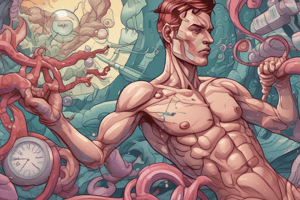Podcast
Questions and Answers
What are common complaints in cardiac cases?
What are common complaints in cardiac cases?
- Headache
- Chest pain (correct)
- Low blood pressure
- Shortness of breath
What is the primary medication for chest pain management?
What is the primary medication for chest pain management?
Nitroglycerin
The clenched fist at the heart is an indication of ________ chest pain.
The clenched fist at the heart is an indication of ________ chest pain.
ischemic
Passive ankle pumps are preferred over active ankle pumps in chest pain management.
Passive ankle pumps are preferred over active ankle pumps in chest pain management.
What are some causes of chest pain?
What are some causes of chest pain?
What should be administered first if chest pain persists after 5 minutes of nitroglycerin intake?
What should be administered first if chest pain persists after 5 minutes of nitroglycerin intake?
What could indicate the start of a myocardial infarction?
What could indicate the start of a myocardial infarction?
Chest pain experienced while sleeping is known as nocturnal angina.
Chest pain experienced while sleeping is known as nocturnal angina.
Which of the following is NOT a symptom of myocardial infarction?
Which of the following is NOT a symptom of myocardial infarction?
What is a common referred pain associated with chest pain?
What is a common referred pain associated with chest pain?
Cyanosis indicates ________ in patients.
Cyanosis indicates ________ in patients.
Study Notes
Hypotension and Chest Pain
- Chief complaint for patients with hypotension often includes low blood pressure.
- Common in cardiac cases; monitor blood pressure every 5 minutes.
- Active ankle pumps are recommended for managing hypotension; passive ankle pumps may be used if active is not feasible, despite no supporting studies.
Chest Pain Characteristics
- Levine Sign indicates ischemic chest pain.
- Referred pain locations:
- Jaw (most common)
- Left shoulder (ulnar side due to cardiac innervation from C4-T1)
- Chest
- Upper trapezius
- Neck (left side)
Types of Chest Pain
- Ischemic cardiac pain (myocardial infarction):
- Sudden onset, lasting over 30 minutes, not relieved by rest.
- Anginal pain:
- Four types, including chronic stable angina (predictable, triggered by exercise/stress/emotions).
First-Line Medication
- Primary medication for chest pain is nitroglycerin (NTG), administered sublingually for rapid absorption.
- NTG dilates arterial and venous blood vessels of the heart.
- If chest pain persists after 5 minutes of first NTG dose, a second tablet can be given; if pain continues after the third dose, call emergency services.
Additional Management Notes
- Caution against moving a patient experiencing chest pain to prevent venous pooling.
- Monitor for symptoms indicating myocardial infarction including headache, vomiting, pallor, dizziness, and diaphoresis.
Angina Types and Symptoms
- Prinzmetal or variant angina is characterized by coronary artery spasm, more common in women.
- Nocturnal angina occurs during sleep and may lead to congestive heart failure.
Other Cardiac Symptoms
- Palpitations or arrhythmias indicate possibly serious heart conditions.
- Dyspnea (shortness of breath) is another manifestation of heart issues.
- Cyanosis can be assessed with capillary refill tests to evaluate circulatory adequacy.
- Syncope (fainting) may be included in subjective symptoms related to cardiac conditions.
Studying That Suits You
Use AI to generate personalized quizzes and flashcards to suit your learning preferences.
Related Documents
Description
This quiz focuses on the management of hypotension in cardiac patients, including essential nursing interventions and monitoring strategies. Test your knowledge on recognizing symptoms, chief complaints, and appropriate action steps for effective care.




